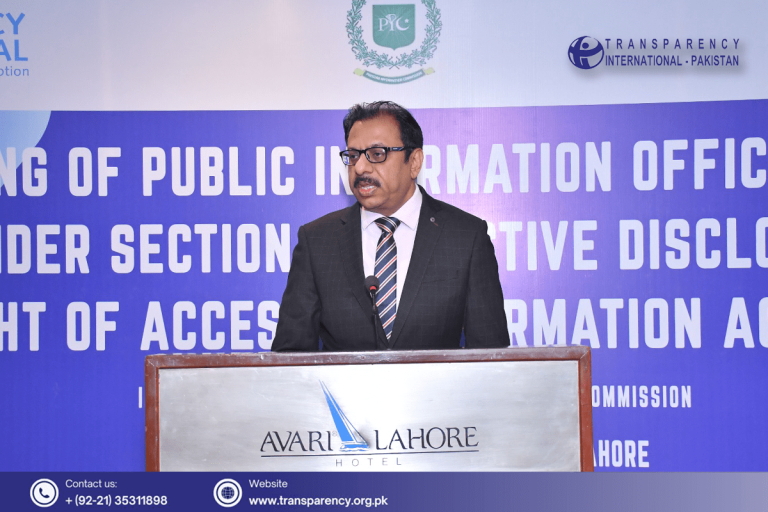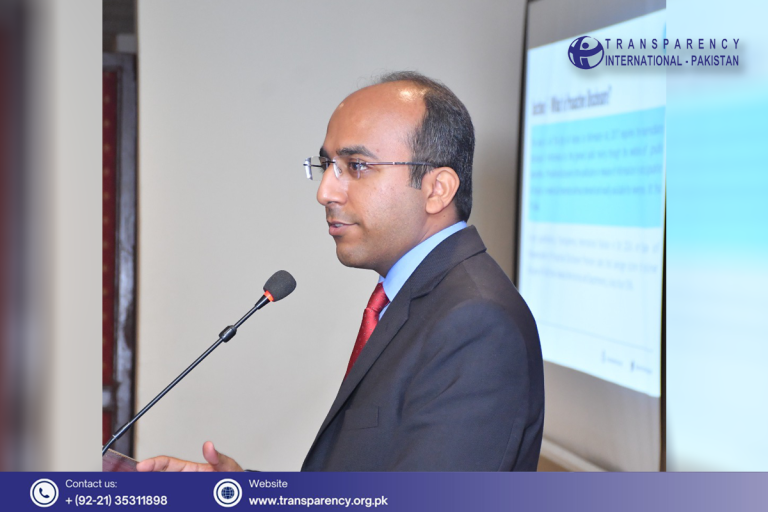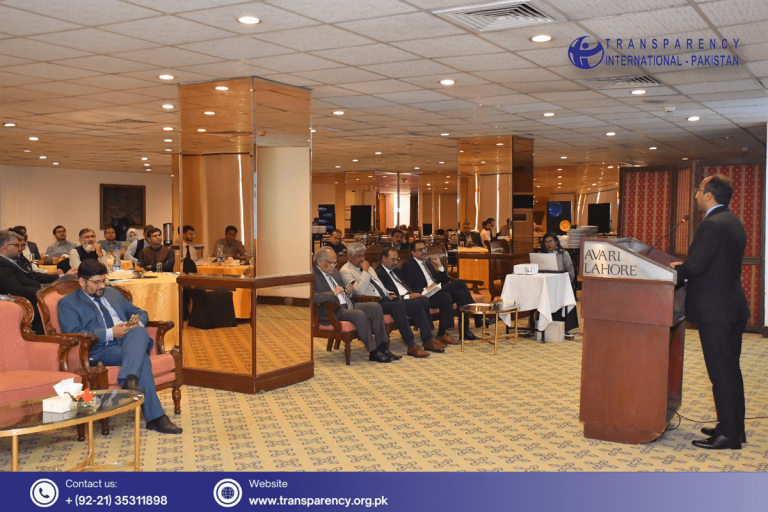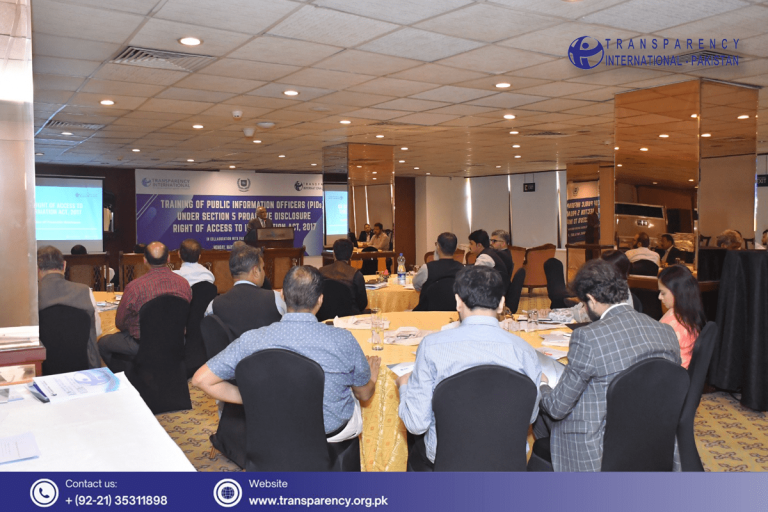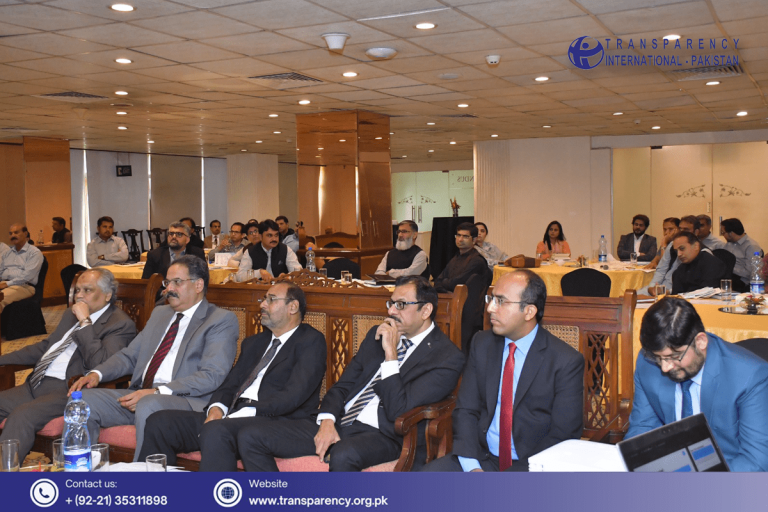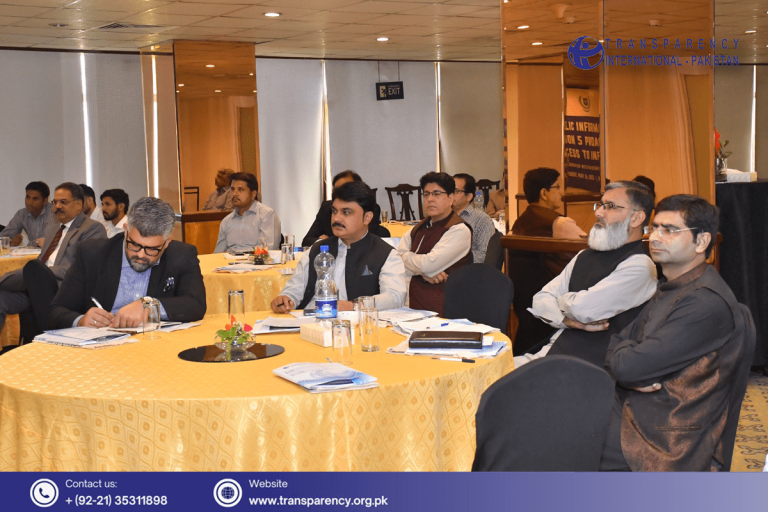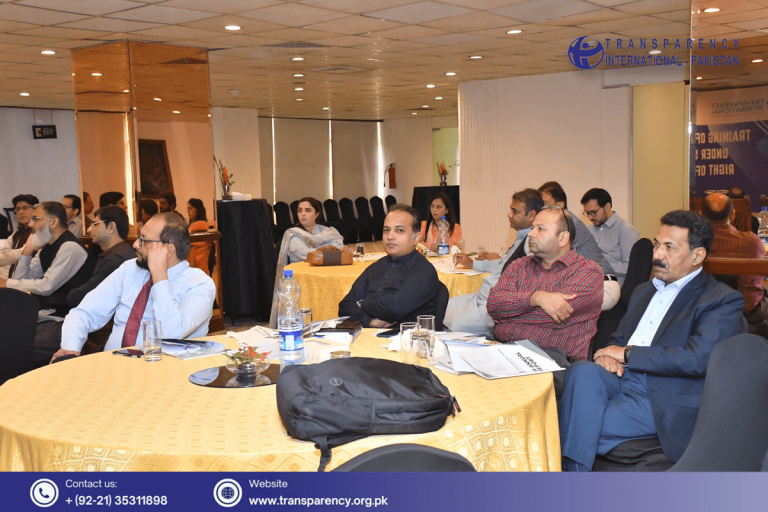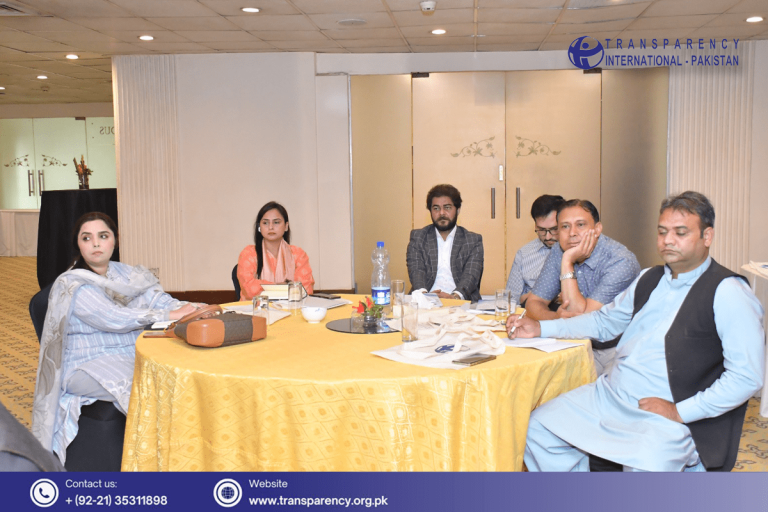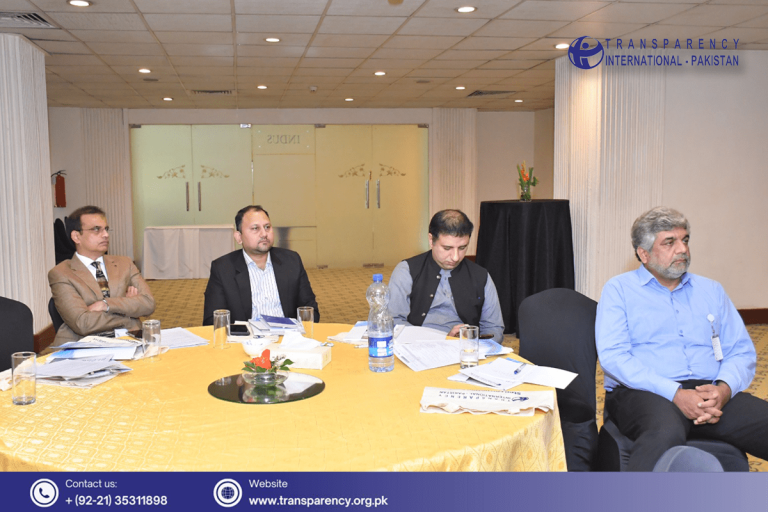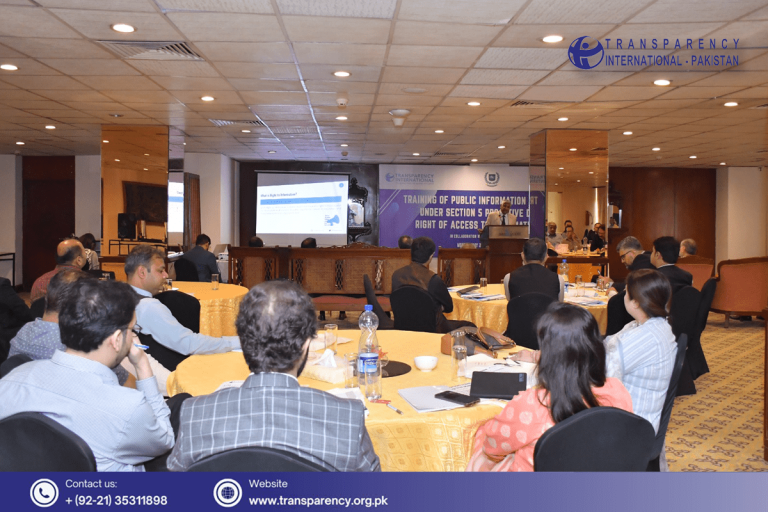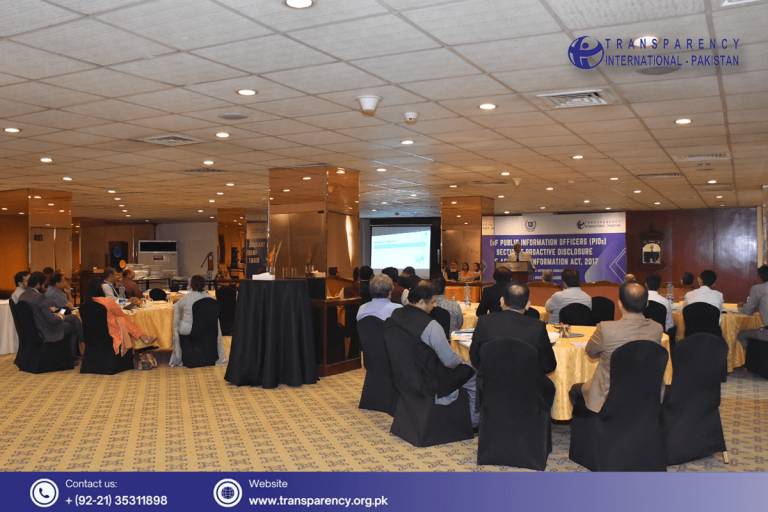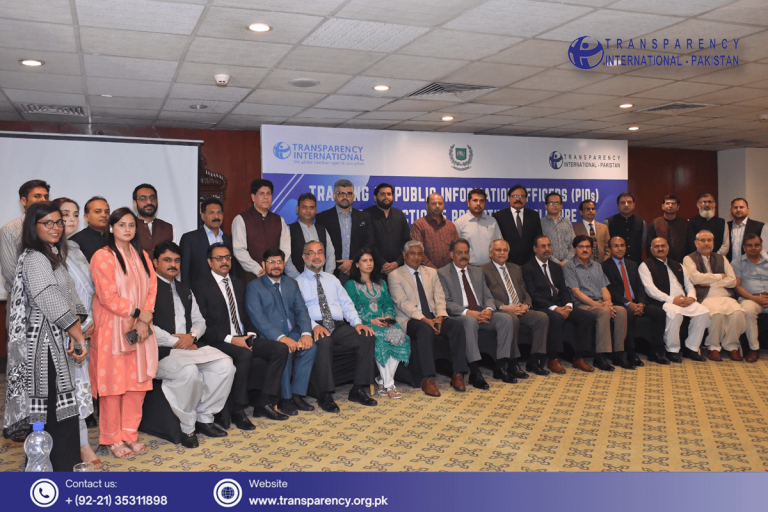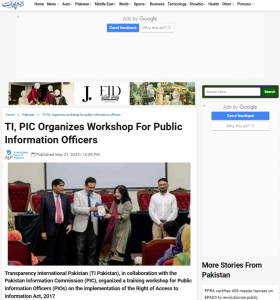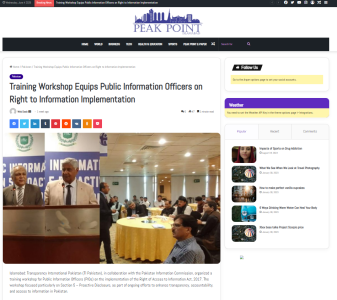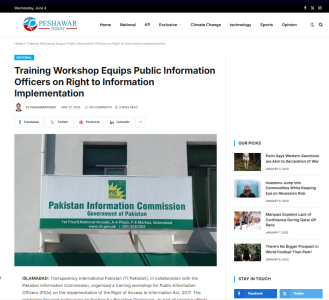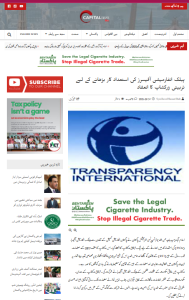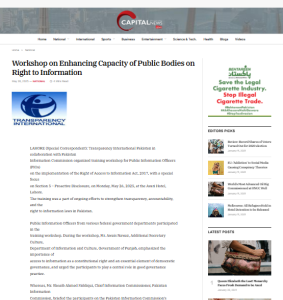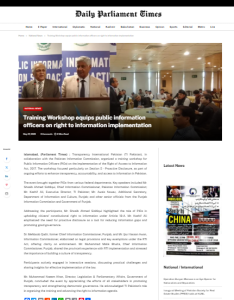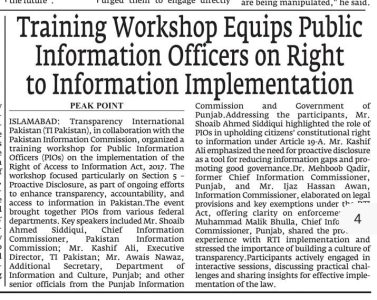Training of Public Information Officers (PIOs) on Section 5 – Proactive Disclosure Under the Right of Access to Information Act, 2017
Training of Public Information Officers (PIOs) on Section 5 – Proactive Disclosure Under the Right of Access to Information Act, 2017
Date: Monday, May 26, 2025
Venue: Avari Hotel, Lahore
Organized by: Transparency International Pakistan in collaboration with the Pakistan Information Commission
On Monday, May 26, 2025, Transparency International Pakistan, in collaboration with the Pakistan Information Commission, organized a capacity building workshop titled “Training of Public Information Officers (PIOs) on Section 5 – Proactive Disclosure under the Right of Access to Information Act, 2017.” Held at the Avari Hotel, Lahore, the workshop aimed to strengthen the role of Public Information Officers in the implementation of Pakistan’s federal RTI law, with a particular focus on proactive disclosure mechanisms under Section 5 of the Right of Access to Information Act, 2017 Act.
The event brought together over 35 Public Information Officers (PIOs) from various federal government departments, with a primary focus on enhancing their capacity to implement Section 5 – Proactive Disclosure under the Right of Access to Information Act, 2017. The training emphasized the practical mechanisms through which PIOs can fulfill their statutory duty to proactively publish key categories of public information such as budgets, audit reports, and organizational structures without waiting for formal requests. By equipping PIOs with actionable strategies for proactive disclosure, the workshop aimed to strengthen institutional transparency, reduce barriers to citizen access, and foster a culture of open governance.
The session began with the recitation of the Holy Quran. Prior to the formal proceedings, a pretest was conducted to assess participants’ baseline understanding of the Right to Information (RTI) framework and public information officers’ (PIOs) roles and responsibilities.
This was followed by opening remarks delivered by Mr. Awais Nawaz, Additional Secretary, Department of Information and Culture, Government of Punjab. He reaffirmed that access to information, enshrined as a constitutional right under Article 19A, is not only a legal obligation but a vital mechanism to empower citizens and enhance democratic accountability. Mr. Nawaz emphasized that Public Information Officers (PIOs) must act as facilitators of open governance by ensuring that relevant information is proactively disclosed and easily accessible to the public. He called for a shift from reactive compliance to active implementation urging departments to institutionalize systems that support timely, citizen oriented disclosures. By doing so, he noted, public institutions can strengthen trust, improve service delivery, and fulfill their duty to engage citizens as partners in governance.
Following the opening remarks, Mr. Shoaib Ahmed Siddiqui, Chief Information Commissioner at the Pakistan Information Commission, welcomed the participants and provided a comprehensive overview of the Commission’s mandate. He elaborated on the efforts undertaken to implement the Right of Access to Information Act, 2017 across federal public bodies, emphasizing both progress and persistent institutional challenges. Mr. Siddiqui highlighted that the effective implementation of RTI legislation hinges on the capacity, awareness, and proactive commitment of Public Information Officers (PIOs). He urged participants to recognize their critical role in bridging the gap between citizens and state institutions by ensuring timely, transparent, and accessible information.
He further stressed that strengthening internal RTI systems within government departments not only enhances legal compliance but also fosters greater public trust, accountability, and improved service delivery. His remarks underscored the strategic importance of institutionalizing transparency as a cornerstone of democratic governance in Pakistan.
Continuing the session proceedings, Mr. Kashif Ali, Executive Director of Transparency International Pakistan, then took the floor to introduce TI Pakistan’s mission and strategic initiatives aimed at promoting transparency, accountability, and citizens’ right to access public information. He outlined TI Pakistan’s ongoing efforts with a specific focus on strengthening civic voices and fostering democratic accountability.
Mr. Ali emphasized that the Right to Information (RTI) framework should not be perceived as a procedural obligation, but rather as a strategic enabler of institutional development and meaningful public engagement. He underscored the critical role that civil society organizations (CSOs) play in advocating for legal reforms, building awareness, and collaborating with government entities to promote a culture of openness.
Next, Dr. Mehboob Qadir, former Chief Information Commissioner of the Punjab Information Commission, delivered a comprehensive presentation on the Right of Access to Information Act, 2017. Drawing from his experience in institutional oversight, Dr. Qadir walked participants through the key provisions of the law, elaborating on the statutory responsibilities of public bodies and the categories of information that must be disclosed under the Act.
He clarified procedural requirements such as designating Public Information Officers (PIOs), maintaining updated records, and adhering to response timelines. Emphasizing the operational aspects, he highlighted that robust recordkeeping systems and clear internal communication protocols are vital to ensuring the timely and lawful provision of information to citizens. Dr. Qadir also addressed common bottlenecks in compliance and provided practical recommendations to help government departments improve their internal RTI frameworks. His session served as a critical capacity building component, reinforcing the link between administrative efficiency and legal compliance in upholding transparency and accountability.
Following a short tea break and an interactive Q&A session, participants engaged directly with the speakers to clarify legal and procedural aspects of RTI implementation. Questions focused on practical challenges in processing information requests, handling sensitive data, and ensuring consistency in disclosures across departments.
After the break, Mr. Ijaz Hassan Awan, Information Commissioner, Pakistan Information Commission, led the next session, addressing the key exemptions outlined in the Right of Access to Information Act, 2017. He provided a detailed explanation of the legal justifications for withholding specific categories of information, such as matters concerning national security, individual privacy, and commercial confidentiality, and dispelled common misconceptions around these exemptions. He also encouraged PIOs to thoroughly document the rationale behind any denial of information in line with the provisions of the Act.
Moving on, Mr. Muhammad Malik Bhulla, Chief Information Commissioner of the Punjab Information Commission, shared critical insights on the implementation of the Right of Access to Information Act, 2013 in Punjab. He highlighted the Commission’s pivotal role in monitoring compliance, addressing grievances, and empowering citizens to exercise their constitutional right to information. Mr. Bhulla stressed the importance of moving beyond reactive disclosure towards fostering a culture of proactive information sharing within public institutions. He emphasized that effective implementation of the RTI Act is fundamental to strengthening democratic governance, enhancing transparency, and building public trust.
Building on earlier discussions about proactive disclosure of information, Mr. Kashif Ali, Executive Director of Transparency International Pakistan, delivered a focused presentation on Section 5 of the Right of Access to Information Act, 2017, which mandates public bodies to proactively disclose specific categories of information on their websites. He highlighted that proactive disclosure mandated under 15 specific clauses is a legal obligation requiring public bodies to publish key categories of information online without waiting for formal citizen requests. These include organizational functions, decision-making processes, budgets, audit reports, rules and policies and etc. Mr. Ali underscored that the intent of Section 5 is to make essential information publicly accessible online without requiring citizens to file formal requests. Drawing from TI Pakistan’s 2023 report titled “State of Implementation of Proactive Disclosure Provision: Case Study of the Federal Right of Access to Information Act 2017”, he noted that compliance remains alarmingly low across federal entities, with less than 35% of the required information disclosed. Using practical case scenarios, he illustrated how PIOs can operationalize each clause effectively and urged them to institutionalize digital disclosure tools, standardized templates, and internal protocols. His session reinforced that proactive disclosure is central to enabling citizen oversight, preventing corruption, and embedding transparency into the governance fabric.
During the closing discussion and Q&A session, participants shared insights from their departments and raised questions regarding exemption handling, resource constraints, and coordination challenges. The dialogue provided an opportunity for peer learning and direct interaction with experts from the Pakistan Information Commission, Punjab Information Commission, Law and Information Departments.
In closing remarks, Mr. Muhammad Naeem Khan, Director of Legislation & Parliamentary Affairs, Government of Punjab, delivered the closing remarks. He commended the organizers for their efforts in equipping public officials with practical tools for improving transparency. He emphasized the importance of regular training, and support to ensure progress in RTI implementation.
Mr. Shoaib Ahmed Siddiqui, Chief Information Commissioner, Pakistan Information Commission, offered a vote of thanks, recognizing the participation of all stakeholders and reaffirming the Commission’s commitment to transparency and citizen empowerment. He also thanked TI Pakistan for its collaboration with the Information Commissions at the federal and provincial levels to enhance capacity of public bodies and designated officers on the implemented of RTI laws across the country.
Before the closing, a posttest was conducted to evaluate participants’ understanding of the training content and to assess the effectiveness of the session. The event concluded with a certificate distribution

